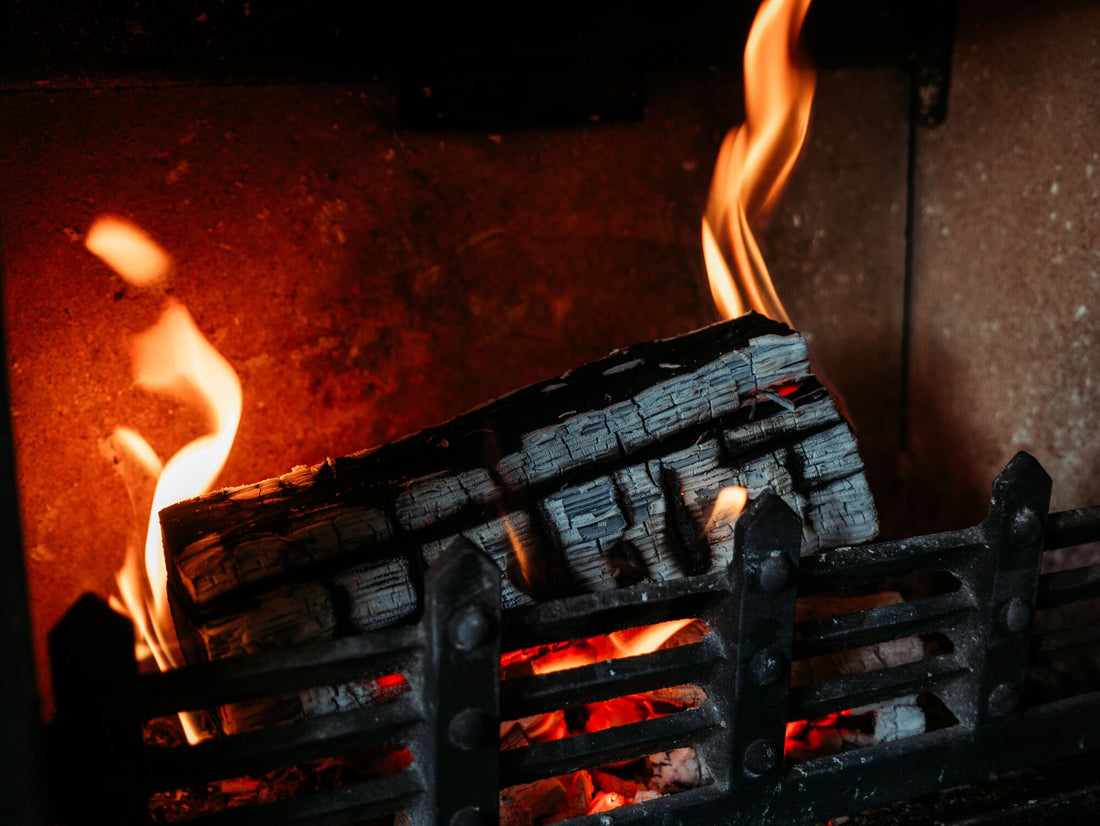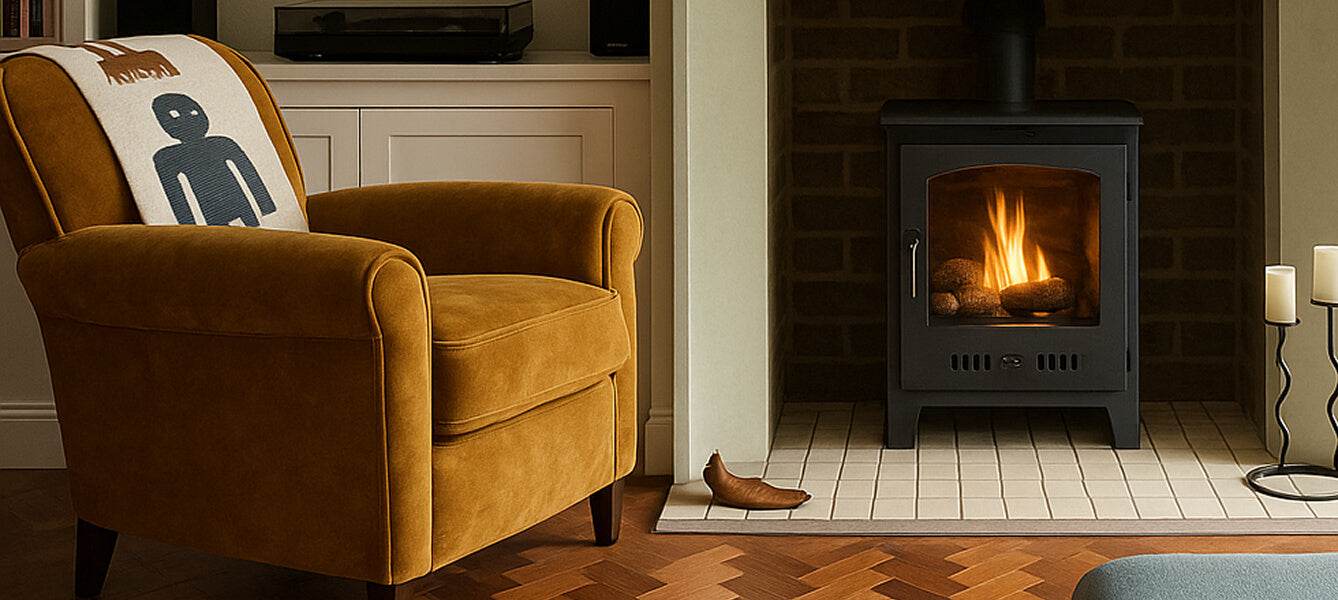
Are you confused by the ever-changing regulations regarding what you can and can't burn in your wood-burning stove?
You're certainly not alone.
While you probably love the snap and crackle of your real fire, did you know that you could receive a log burner fine for misusing your fireplace?
Indeed, UK regulations have tightened over the past decade, dictating what you can burn and how you burn it.
And while many of the regulations refer to manufacturing standards that are out of your hands as a consumer, there are restrictions about the type of fuel you can use in your wood burner.
This article explores the current UK regulations for wood burners, helping you avoid a fine for using your wood-burning stove.
We'll also explore an alternative greener fuel so that you can continue to enjoy that beautiful, cosy real fire without the environmental damage.
What are the latest regulations for wood burning in the home?

In recent years, the UK government has demonstrated a commitment to a 25-Year Environmental Plan, setting out ten core goals that should help protect the environment.
The second goal in this list of ten is Clean Air, which relates — in part — to domestic wood- and coal burning.
Alongside this is the Europe-wide Ecodesign policy, which regulates the manufacture of new wood-burning stoves to ensure minimal smoke and particle pollution.
Ecodesign stoves push as much air into the fire as possible, reducing the amount of smoke it produces by up to 90% while increasing burning efficiency by creating more heat with less fuel.
The fines for burning the wrong fuel in your wood burner
The latest iteration of the UK's environmental regulations was announced in The 2023 Environmental Improvement Plan.
This update confirmed that burners in "Smoke Control Areas" can emit 3g of smoke per hour rather than the 5g of smoke previously allowed.
This limit refers to domestic users and businesses, resulting in an on-the-spot fine of £300 and potential criminal prosecution for persistent offenders.
Do I live in a Smoke Control Area?
Most UK towns and cities are now designated Smoke Control Areas.
However, if you’re unsure, contact your local council’s environmental services department or consult the DEFRA’s interactive Smoke Control map.
Why is the government limiting the amount of smoke I can emit?

The Department for Environment, Food, and Rural Affairs (aka DEFRA) states that coal and log burners are one of the UK’s most prolific sources of airborne fine particulate matter, such as soot.
These particles enter the lungs, causing a range of health conditions, including lung and heart conditions, cancer, strokes, and asthma.
It might surprise you to discover that domestic fires pollute the air more than industry and road traffic put together. This is why the UK government is encouraging us towards greener heating fuels wherever possible.
To put things into context, DEFRA calculates that:
- Domestic fires and stoves
- create up to 38% of the airborne particulates in UK towns and cities, while
- Industry produces 16% of the UK's fine particulate matter, and
- Road traffic creates 12%
What fuels can I safely burn in my wood burner?
As part of the government's environmental policy, it's now illegal for England's retailers to sell wet wood (sometimes known as "green wood") or house coal.
This doesn't mean that you can no longer burn wood - but it's now only legal to burn fuel certified "Ready to Burn".
Ready to Burn fuel is:
- Naturally or kiln-dried logs with
- less than 20% moisture
Dry logs emit very little smoke when burnt. That’s why you need to look for the Ready to Burn certification on your log packaging.
Remember, wet wood produces more smoke and eventually blocks your chimney. You'll still need to sweep your chimney with dry wood, but less regularly.
Also, avoid burning scrap wood, including:
- Fence panels
- MDF
- Pallets
- Furniture
You might think that old furniture is bound to be dry enough to burn safely, but it will have been treated with a wood preserver, which gives off harmful fumes when burnt.
Will I be banned from using my log burner?

No. The government acknowledges that some households heavily rely on solid fuels as their primary source of heating, cooking, and hot water. There's no indication that the government is considering a ban in the mid-to-long term.
However:
If you have an old burner that doesn’t comply with Ecodesign regulations, consider upgrading or choosing an alternative, greener fuel for your fireplace.
Because:
It’s still essential to comply with local regulations regarding the burning of domestic combustible fuels. If you don’t, you could be liable for a hefty log burner fine.
Do I need planning permission for a wood-burning stove?
In most cases, you don't need permission for a wood-burning stove if it's installed professionally by a HETAS-approved installer (Heating Equipment Testing and Approval Scheme).
Fitting a wood-burning stove is a specialist task, and it can be dangerous if incorrectly installed.
If you're installing your stove yourself or using a non-HETAS-approved installer, you should let your local Building Control department know before you start any work. However, a HETAS-approved installer will do the necessary paperwork for you.
While this isn't planning permission, informing your local building control department is necessary.
And:
If you plan to sell your house, you'll need a HETAS certificate to confirm that your wood-burning stove complies with building regs.
Do I need a HETAS certificate for my wood burner?

You need a HETAS Certificate of Compliance for any solid fuel appliance in your home or business fitted after April 2005. The certificate confirms that the installation complies with building regulations and is safe for use.
So, while it's not illegal to fit your stove yourself, you will need a HETAS certificate to confirm it has been checked. You can self-certify under the Competent Person Scheme (CPS), eliminating the need for building applications.
However:
You risk invalidating your home insurance if you don’t have a valid HETAS certificate. And failure to notify your local authority could result in a fine of £5000!
How much does a HETAS inspection cost?
The HETAS certificate covers the fireplace, flue, and any other ventilation. While costs vary depending on the HETA-authorised installer/inspector, it can cost between £120 and £300 for the inspection, although there’s no guarantee your fireplace will meet the criteria.
This is why it's essential to get your new wood burner professionally installed by a HETAS-registered installer, as they will ensure the work is done to the appropriate standards and organise the paperwork.
If you’ve lost your certificate, you can get a replacement digital copy from the HETAS website.
Bioethanol fireplaces don’t need a HETAS certificate
If this all sounds like a lot of work, consider another way of getting the perfect real flame in your home without the pollution.
Bioethanol fireplaces burn bioethanol fuel — a byproduct of the agricultural industry. There’s no smoke, soot, ash, or mess — bioethanol burns cleanly and is 100% energy efficient because the heat produced by the fire stays in the room (rather than sucked into the chimney).

And choose from a wide range of styles, from wood-burner style biofires to funky freestanding or wall-mounted models that bring a modern touch of elegance to your living space.
You can even buy bioethanol converter kits to transform your wood burner into a cleaner, greener bioethanol fireplace. Or choose a fireplace insert if you have an open fire.
How to avoid a wood burner fine in the UK
While there are no plans to ban the burning of wood in domestic fireplaces, several new regulations are dictating the type of fuel you burn.
Always ensure your wood is certified Ready to Burn, and you should avoid a wood burner fine.
However, consider the benefits of bioethanol as an alternative fuel — offering a cleaner, greener way of heating your home with none of the existential guilt!

Thanks for reading.
